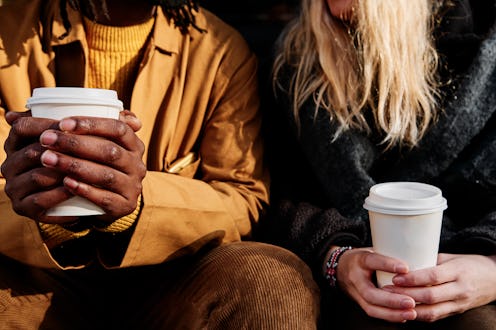Food
The Real Reason Coffee Makes Your Feel Nauseous, According To Experts
Nutritionists, dieticians, & gut specialists weigh in.

Mornings are never quite complete without a warm drink to kick start the day. Tea’s nice and all, but for me, I can’t live without a delicious cup of coffee. Sadly, however, we all know that too much coffee can be bad for you. It’s likely most of us have experienced the jitters after one too many cups, but what about feeling sick after having coffee? Is there any scientific explanation behind why can coffee make you feel nauseous?
Caffeine can be a wondrous thing: in the right doses, it may enhance both mental and physical performance, and may even help to reduce the risk of Type-2 diabetes and metabolic syndrome. However, it can also have detrimental impacts that make you feel like absolute hell. While most of these side effects you'd only experience if you have a lot of caffeine (I'm talking tens of cups) — coffee-induced nausea is unfortunately relatively common, especially if you've got a sensitive stomach already.
Why Do I Feel Sick After Drinking Coffee?
Acidity
It's all down to science. One common reason for feeling nauseous after coffee is its acidity, which, according to Trista Best, registered dietician and professor of nutrition, can range from 4.5 to 5.5 in terms of pH. “This can lead to gastrointestinal discomfort, nausea, and reflux,” Best says.
Caffeine is a stimulant, so it encourages the digestive system to work a little faster, including creating more stomach acid than necessary. “Stimulating the stomach, especially when it’s empty and can quickly absorb the caffeine, can cause nausea,” Diana Gariglio-Clelland, a registered dietitian with Balance One explains. “It also relaxes the gastroesophageal sphincter, the opening at the bottom of the esophagus where food is emptied into the stomach.” When this sphincter relaxes, it can allow some stomach acid to leak up into the esophagus, which can cause acid reflux, heartburn, and nausea.
Diuretic effects
While acid reflux and nausea is bad enough, for some people is also the additional element of caffeine’s *ahem* laxative effects. Caffeine is a diuretic, which means it promotes excretion of water from your body, in one way or another. “A diuretic causes water to be drawn from the blood and into the digestive system,” Lisa Richards nutritionist and author of The Candida Diet, says, “which can result in nausea or diarrhoea.”
Milk & sweeteners
If you feel like these two factors don’t offer an explanation as to why you feel nauseous after drinking coffee, it also may depend on how you're drinking it. Adding milk and sweetener? Both can irritate the stomach and, in turn, cause you to feel nauseous.
Artificial sweeteners can upset your gut’s natural microbiome, causing further distress to your poor acid-filled tum, and if you find you’re feeling particularly sick after a milky coffee, you could be lactose-intolerant. It's worth speaking to your doctor if you have any concerns or questions regarding symptoms.
How To Prevent Feeling Nauseous After Coffee
You can still have your morning cup of joe without feeling nauseous every time – and it all comes back to those acids.
Eat something
According to Gariglio-Clelland, having food in your stomach before drinking coffee will help. “The best way to avoid caffeine-induced nausea is to eat something before drinking coffee, or at least with your coffee,” she says. “A piece of toast will even do the trick, but protein foods like yogurt, eggs, and cheese can help slow digestion a little bit, which can improve nausea.”
Drink it black or switch up your milk
Another option is either ditching the cow’s milk altogether or opting for a plant-based option, Dr Sunni Patel, clinician and gut health specialist, says. He also suggests avoiding all artificial sweeteners.
Stay hydrated
Lastly, you've got to stay hydrated. While a study from the NHS reported that a "small amount of coffee will not dehydrate you," drinking lots of water lessens the harsh effects of coffee on the stomach and keeps your electrolytes up, says Dr Patel, “especially if the coffee is making you go to the toilet more often.”
Try cutting down
If none of these options work, cutting down on your coffee intake may be the only way to go.
“Find other alternatives to get your pick-me-up or wake up that you need. Try a walk, exercise or other cold drinks, shakes, or smoothies,” says Dr Patel. “And, if you really need a coffee, try it later in the morning or early afternoon.”
This article was originally published on